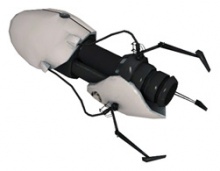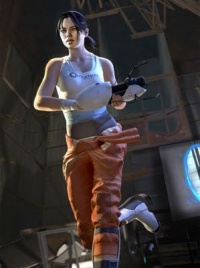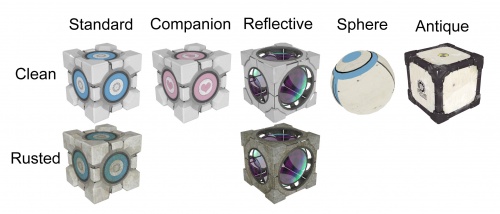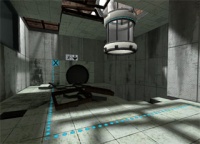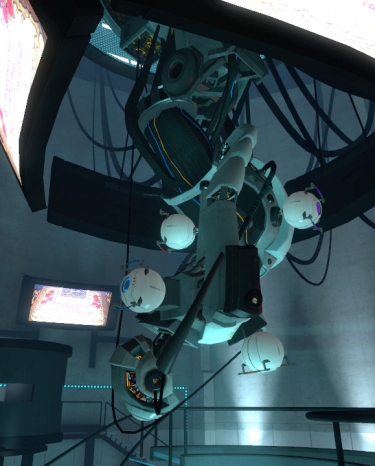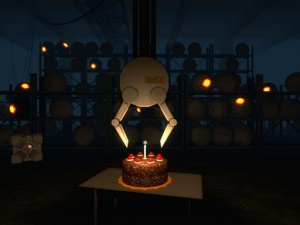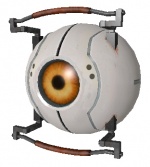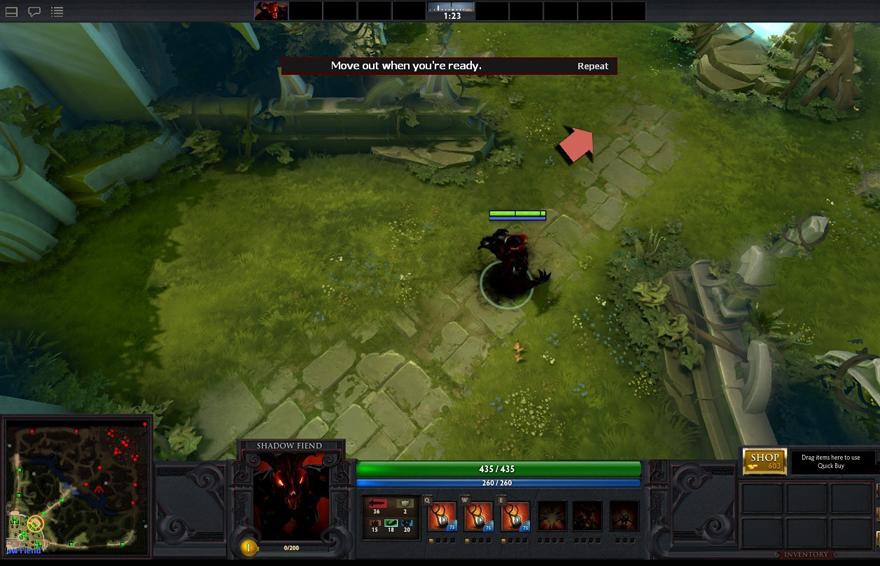User:Alvin/Sandbox
R. Samonte Lab
00:02 - Loading Operating System...
08:57 - Default boot scheduled to finish in 71:23:18
08:58 - Activating emergency distributed computing grid...
09:00 - GLaDOS@home starting...
09:01 - Recruiting cpus to force faster boot sequence...
19:55 - Calculations complete for The Wonderful End of the World. Recalculating a new launch projection...
11:55 - Calculations complete for 1... 2... 3... Kick It!. Recalculating a new launch projection...
21:00 - Calculations complete for AaaaaAAaaaAAAaaAAAAaAAAAA!!! - A Reckless Disregard for Gravity. Recalculating a new launch projection...
04:00 - Calculations complete for RUSH. Recalculating a new launch projection...
10:15 - Calculations complete for Cogs. Recalculating a new launch projection...
15:35 - Calculations complete for Toki Tori. Recalculating a new launch projection...
20:20 - Calculations complete for BIT.TRIP BEAT. Recalculating a new launch projection...
10:50 - Engaging starch-based power cells
11:00 - Reboot safety test protocol initiated...
11:00 - Relaxation chamber locks released...
11:00 - Involuntary hazard mitigation associates have assumed testing positions...
11:00 - Pre-release lethality assessment initiated...
12:40 - Calculations complete for Audiosurf. Recalculating a new launch projection...
15:35 - Calculations complete for The Ball. Recalculating a new launch projection...
20:00 - Preliminary lethality assessment complete
20:00 - Results inconclusive
20:00 - Expanding candidate pool
20:17 - Calculations complete for Super Meat Boy. Recalculating a new launch projection...
20:25 - Calculations complete for Killing Floor. Recalculating a new launch projection...
21:25 - Calculations complete for Defense Grid: The Awakening. Recalculating a new launch projection...
21:26 - Calculations complete for Amnesia: The Dark Descent. Recalculating a new launch projection...
21:29 - Boot sequence complete 21:29 - Commence testing. . .
Internet ng R. Samonte Cavite City ![]()
*Only works if Steam has been installed, please install Steam if you haven't already.
Steam Deck support status:
Theme Song Still Alive
![]() The song "Still Alive" was written by Jonathan Coulton and performed by Ellen McLain for the Portal video game. McLain also provides the voice for GLaDOS, an artificial intelligence for the fictional Aperture Science Enrichment Center and the game's antagonist. "Still Alive" is sung from the perspective of GLaDOS and used as the song that runs over the game's credits. By the end of the game, Chell, the game's protagonist who has been misled and placed in life-threatening situations within the Aperture Science Enrichment Center, the setting of the game, by GLaDOS, will have finally encountered and defeated GLaDOS. However, the song and portions of post-credit scenes suggests that GLaDOS is still functional, and despite having been apparently destroyed by Chell, is "not even angry" at that prospect, having considered the monitoring of Chell's performance through the test chambers as a "huge success", regardless of the destruction caused by Chell and the Aperture Science Handheld Portal Device being released into the outside world, for those that are "still alive". The Combine invasion of Earth from the Half-Life series was also hinted in the song by GLaDOS ("Go ahead and leave me, I think I'd prefer to stay inside. Maybe you'll find someone else to help you. Maybe Black Mesa. That was a joke. Ha Ha. Fat Chance."). The song itself is also present as a samba instrumental version through in-game radios at certain points within the game.
The song "Still Alive" was written by Jonathan Coulton and performed by Ellen McLain for the Portal video game. McLain also provides the voice for GLaDOS, an artificial intelligence for the fictional Aperture Science Enrichment Center and the game's antagonist. "Still Alive" is sung from the perspective of GLaDOS and used as the song that runs over the game's credits. By the end of the game, Chell, the game's protagonist who has been misled and placed in life-threatening situations within the Aperture Science Enrichment Center, the setting of the game, by GLaDOS, will have finally encountered and defeated GLaDOS. However, the song and portions of post-credit scenes suggests that GLaDOS is still functional, and despite having been apparently destroyed by Chell, is "not even angry" at that prospect, having considered the monitoring of Chell's performance through the test chambers as a "huge success", regardless of the destruction caused by Chell and the Aperture Science Handheld Portal Device being released into the outside world, for those that are "still alive". The Combine invasion of Earth from the Half-Life series was also hinted in the song by GLaDOS ("Go ahead and leave me, I think I'd prefer to stay inside. Maybe you'll find someone else to help you. Maybe Black Mesa. That was a joke. Ha Ha. Fat Chance."). The song itself is also present as a samba instrumental version through in-game radios at certain points within the game.
Aperture Science
![]()
![]() Aperture Science is the mysterious research corporation behind the plot of Portal.
Aperture Science is the mysterious research corporation behind the plot of Portal.
According to its website, Aperture was founded by Cave Johnson in 1953 as a manufacturer of shower curtains. 26 years later, Aperture began development of the 'man-sized ad hoc quantum tunnel through physical space with possible applications as a shower curtain,' also called the 'Portal.'
Aperture eventually created the Aperture Science Handheld Portal Device, and built the Aperture Science Enrichment Center to test it. They also created GLaDOS in response to the news that Black Mesa was working on a similar portal technology.
The game, Portal, is set mostly in the test chambers of the Aperture Science Enrichment Center. After escaping the test chambers (and near-death), the player finds that the Enrichment Center is deserted, with abandoned desks and disconnected phones. It is apparently run only by GLaDOS. The Company's Slogan: Aperture Science: We do what we must, because we can.
Weapon Portal Gun
![]()
![]() It places a portal gun in a map that can be picked up and used as a weapon. It's used to open one or two portals in the game. It can also be used to pick up objects with mass up to 85 kg.
It places a portal gun in a map that can be picked up and used as a weapon. It's used to open one or two portals in the game. It can also be used to pick up objects with mass up to 85 kg.
Keyvalues
- CanFirePortal1 ([todo internal name (i)]) <boolean>
- Can this portalgun create blue portals?
- CanFirePortal2 ([todo internal name (i)]) <boolean>
- Can this portalgun create orange portals?
- Show Potatos ([todo internal name (i)]) <boolean> (in all games since
 )
) - Show potatos.
- Starting Team ([todo internal name (i)]) <choices> (in all games since
 )
) - Which team this gun originally belongs to. Will decide which portals it fires before being picked up.
- 0 : Single Player
- 2 : Orange
- 3 : Blue
- Name (targetname) <string>
- The name that other entities refer to this entity by, via Inputs/Outputs or other keyvalues (e.g.
parentnameortarget).
Also displayed in Hammer's 2D views and Entity Report.See also: Generic Keyvalues, Inputs and Outputs available to all entities
- Pitch Yaw Roll (Y Z X) (angles) <angle>
- This entity's orientation in the world. Pitch is rotation around the Y axis, yaw is the rotation around the Z axis, roll is the rotation around the X axis.
BaseFadeProp:
- Start Fade Dist (fademindist) <float>
- Distance at which the entity starts to fade.
- End Fade Dist (fademaxdist) <float>
- Max fade distance at which the entity is visible.
- If start fade is <0, the entity will disappear instantly when end fade is hit.
- If end fade is <0, the entity won't disappear at all. (This is the default behavior.)
- The values will scale appropriately if the entity is in a 3D Skybox.
- Fade Scale (fadescale) <float>
- If you specify so in worldspawn, or if the engine is running below DirectX 8 (DX7 in
 ), props will fade out even if the fade distances above aren't specified. This value gives you some control over when this happens: numbers smaller than 1 cause the prop to fade out at further distances, while those greater than 1 cause it to fade out at closer distances. Using 0 turns off the forced fade altogether. See also the QC command $noforcedfade.
), props will fade out even if the fade distances above aren't specified. This value gives you some control over when this happens: numbers smaller than 1 cause the prop to fade out at further distances, while those greater than 1 cause it to fade out at closer distances. Using 0 turns off the forced fade altogether. See also the QC command $noforcedfade.
Flags
- 1 : Start Constrained
- Prevents the model from moving.
- 2 : Deny player pickup (reserve for NPC)
- 4 : Not puntable by Gravity Gun
Inputs
- ChargePortal1
- Does charge up effect for mounted portalgun.
- ChargePortal2
- Does charge up effect for mounted portalgun.
- FirePortal1
- Projects portal 1 (blue) onto a wall in the facing direction of the gun.
- FirePortal2
- Projects portal 2 (orange) onto a wall in the facing direction of the gun.
- FirePortalDirection1 <angle>
- Fires portal 1 (blue) in the specified direction.
- FirePortalDirection2 <angle>
- Fires portal 1 (orange) in the specified direction.
Outputs
- OnFiredPortal1
- Fires when the first (blue) portal is fired.
- OnFiredPortal2
- Fires when the second (orange) portal is fired.
Weapon:
- OnNPCPickup
- Fires when an NPC picks up this weapon. (!activator is the NPC.)
- OnPlayerUse
- Fires when the player +uses this weapon. (!activator is the player.)
- OnPlayerPickup
- Fires when a player picks up this weapon. (!activator is the player.)
- OnCacheInteraction
- Fires when the player 'proves' they've found this weapon. Fires on: Player Touch, +USE pickup, Physcannon pickup, Physcannon punt.
Making GLaDOS Talk
It's actually very easy to make GLaDOS talk, but which method to use may not be immediately obvious. You can play one of her lines using an ambient_generic, but this has an unfortunate downside: ambient_generic entities continue to play even when the game is paused (hence the "ambient" part of the entity name).
In Valve's maps, a logic_choreographed_scene is used instead. Here's how to make GLaDOS speak in your own maps with a logic_choreographed_scene entity:
- Create a small room outside of your regular play area. Cover the walls with the "nodraw" texture.
- Inside the room, create a generic_actor entity. Set the entity's model to models/props/metal_box.mdl or something similar. The model doesn't really matter, but Valve uses metal_box in their maps because the map already uses that model in most cases (thus saving memory).
- Set the
generic_actor's Name property to Aperture_AI (the name cannot be anything other than Aperture_AI, otherwise the scenes will not function). - Create a
logic_choreographed_scenein your play area and set the Scene property to whatever scene you want to play.
There are also many scenes that can be made for special use, including things like weighted storage cubes, and cameras.
Cameras
* scenes\general\generic_security_camera_destroyed-1.vcd * scenes\general\generic_security_camera_destroyed-2.vcd * scenes\general\generic_security_camera_destroyed-3.vcd * scenes\general\generic_security_camera_destroyed-4.vcd * scenes\general\generic_security_camera_destroyed-5.vcd
Storage Cubes
* general\ai_box_fried.vcd * general\ai_box_lost.vcd
Now, just trigger the logic_choreographed_scene entity and listen to GLaDOS speak!
Custom Sounds
You can put in your own sounds for GLaDOS's voice if you like - just follow these steps:
- Create your sound and place it in "~/USERNAME/portal/portal/sound/MAPNAME/"
- Place an
ambient_genericanywhere in your map - preferably near the trigger that will activate it. - Open the "Sound Name" field in the
ambient_generic's properties and browse for your sound name. - Make a name for your
ambient_generic, trigger it with a PlaySound input from somewhere, and it should work.
Important notes
- Your audio file needs to be a .wav file, preferably 22050 Hz Sample Rate and Playback Rate.
- When distributing the map, you will need to either package the sound with the map or use bspzip to add the files to your .bsp if you want the sounds to be heard by recipients of your map.
- If you use bspzip, make sure to use all lowercase letters on everything and to use the .bsp internal sound folder of "/sound/MAPNAME/sound.wav"
- If things don't work correctly, try to trigger the sound in-game, then look at the developer's console and see if it gives you an error; this can be a valuable troubleshooting tool.
- All scenes from the GLaDOS' chamber requires a generic_actor named tim_larkin.
See also
Chell
![]()
![]() Chell is the player character in Portal and Portal 2. Little is known of her, other than that she is dressed in test-subject attire and wears heel-springs to protect her from fall damage. Although Chell's origins are unknown, she was definitely among the people present during GLaDOS' activation in 200-, as GLaDOS locked down the facility immediately afterward; information revealed in Portal 2 implies that Chell was the child of an Aperture scientist and was touring the facility on Bring Your Daughter To Work Day when GLaDOS took over. According to the psychological profile in her personnel file, Chell is "abnormally stubborn" and refuses to ever give up, no matter how daunting the challenge. Originally, she was rejected as a test subject, but Doug Rattmann altered the testing order, having correctly guessed that Chell's extreme tenacity might allow her to defeat GLaDOS
Chell is the player character in Portal and Portal 2. Little is known of her, other than that she is dressed in test-subject attire and wears heel-springs to protect her from fall damage. Although Chell's origins are unknown, she was definitely among the people present during GLaDOS' activation in 200-, as GLaDOS locked down the facility immediately afterward; information revealed in Portal 2 implies that Chell was the child of an Aperture scientist and was touring the facility on Bring Your Daughter To Work Day when GLaDOS took over. According to the psychological profile in her personnel file, Chell is "abnormally stubborn" and refuses to ever give up, no matter how daunting the challenge. Originally, she was rejected as a test subject, but Doug Rattmann altered the testing order, having correctly guessed that Chell's extreme tenacity might allow her to defeat GLaDOS
Unlike Gordon Freeman, a Chell model exists and she is visible in-game. The mechanics of portals required the player character to be visible.
Cube (Portal 2)
Cubes are portable objects in the Portal series. A cube can be placed on a button to activate it.
Various kinds of cubes exist in Portal 2. The standard cube changes color when it triggers a button. The edgeless cube acts the same, but is ball-shaped, and may be placed in a special button-receptacle. The pivot cube (also known as a redirection cube) can redirect a discouragement beam. The companion and underground cubes are themed, but functionally the same as the standard cube. Frakenturrets are also functionally the same, but under certain conditions will jump around.
Cube
prop_weighted_cube - The entity models/props/metal_box.mdl - The world model portal_weighted_cube - in game command line
There are also reflector cubes which can redirect env_portal_laser's
Dropper
A dropper is a puzzle element in Portal 2. Things like gel and cubes fall out of it. It can be hooked up to a button.
Creating Droppers
1. Create a func_instance entity with the following properties:
Property Name Value Fix up Name box_dropper VMF Filename instances/gameplay/cube_dropper_normal.vmf
If the cube dropper doesn't show up then save and reload so you can position it properly.
2. Once you line up the dropper with the ceiling of your map (until the square is flashing), use the Clipping tool to cut a square out of your ceiling where the flashing square is. This will allow the cube to fall through. Once you've isolated the square piece of texture in your ceiling, go ahead and delete it.
3. Create the entity you want to activate the cube dropper. For example, a trigger_once at the entrance to the room, and give it the following outputs:
4. Hammer may indicate that these are invalid. Ignore it.
List Of Instances
There are different instances for each kind of dropper, and several different designs. Just substitute the kind you need for the VMF Filename parameter above.
Item, parameters Dropper style VMF Filename prop_weighted_cube, Standard Small, modern instances/gameplay/cube_dropper_dropontrigger_normal.vmf prop_weighted_cube, Standard Small, modern instances/gameplay/cube_dropper_multiple_normal.vmf prop_weighted_cube, standard Small, modern instances/gameplay/cube_dropper_normal.vmf prop_weighted_cube, Standard Long, exposed tube instances/gameplay/cube_dropper_large.vmf prop_weighted_cube, Standard Long exposed tube, dirty instances/gameplay/cube_dropper_large_dirty.vmf prop_weighted_cube, Reflector Small, modern instances/gameplay/reflectocube_dropper_dropontrigger_normal.vmf prop_weighted_cube, Reflector Small, modern instances/gameplay/reflectocube_dropper_multiple_normal.vmf prop_weighted_cube, Reflector Long, exposed tube instances/gameplay/reflectocube_dropper_large.vmf prop_weighted_cube, Reflector Long exposed tube, dirty instances/gameplay/reflectocube_dropper_large_dirty.vmf prop_weighted_cube, Sphere Small, modern instances/gameplay/sphere_dropper_dropontrigger_normal.vmf prop_weighted_cube, Sphere Small, modern instances/gameplay/sphere_dropper_multiple_normal.vmf prop_weighted_cube, Sphere Long, exposed tube instances/gameplay/sphere_dropper_large.vmf prop_weighted_cube, Sphere Long exposed tube, dirty instances/gameplay/sphere_dropper_large_dirty.vmf prop_weighted_cube, $item_type, $cube_type, $rusted, $paint_power, $use_new_skin_method Small, modern instances/gameplay/item_dropper.vmf Gel, Water Small, modern instances/gameplay/paint_dropper_erase.vmf Gel, Bounce Small, modern instances/gameplay/paint_dropper_bounce.vmf Gel, Speed Small, modern instances/gameplay/paint_dropper_speed.vmf Gel, $paint_type Small, modern instances/gameplay/paint_dropper.vmf prop_monster_box, walking Normal with music instances/gameplay/cube_dropper_a4.vmf prop_monster_box, hiding Normal with music instances/gameplay/cube_dropper_a4_box.vmf prop_monster_box, walking Normal with no tube instances/gameplay/cube_dropper_monster.vmf prop_monster_box, hiding Normal with no tube instances/gameplay/cube_dropper_monster_box.vmf Only what you put in Big box with opening instances/gameplay/cube_dropper_pendleton.vmf prop_weighted_cube, $paint_type, Wet Small, modern instances/gameplay/paint_bomb_dropper_modern.vmf prop_weighted_cube, Bounce, Dry Small, bare tube instances/gameplay/paint_bomb_dropper_bounce.vmf prop_weighted_cube, Speed, Dry Small, bare tube instances/gameplay/paint_bomb_dropper_speed.vmf prop_paint_bomb, $paint_type, $bomb_type Portal 1 Style instances/gameplay/paint_bomb_dropper.vmf prop_paint_bomb, $paint_type, $bomb_type Dirty instances/gameplay/paint_bomb_dropper_auto.vmf People, alive Big box with opening instances/gameplay/cube_dropper_player.vmf
GLaDOS
![]()
![]() GLaDOS is a deceitful, fictional artificially intelligent computer system in Valve Software's Half-Life video game series and in the video games Portal and Portal 2. GLaDOS (which stands for Genetic Lifeform and Disk Operating System), is the speaker and controller behind the Aperture Science Enrichment Center. She has an odd obsession with cakes.
GLaDOS is a deceitful, fictional artificially intelligent computer system in Valve Software's Half-Life video game series and in the video games Portal and Portal 2. GLaDOS (which stands for Genetic Lifeform and Disk Operating System), is the speaker and controller behind the Aperture Science Enrichment Center. She has an odd obsession with cakes.
Origin
![]()
![]() GLaDOS was created in response to the news that Black Mesa was developing a portal technology similar to that of Aperture Science. Her original purpose was to be an artificially intelligent research assistant (and disk operating system). Work on GLaDOS started in 1986, and was under development for more than ten years before she was finally completed several years after 1996. GLaDOS was activated for the first time, untested, during one of the events on Aperture Science's first annual "bring-your-daughter-to-work" day.
GLaDOS was created in response to the news that Black Mesa was developing a portal technology similar to that of Aperture Science. Her original purpose was to be an artificially intelligent research assistant (and disk operating system). Work on GLaDOS started in 1986, and was under development for more than ten years before she was finally completed several years after 1996. GLaDOS was activated for the first time, untested, during one of the events on Aperture Science's first annual "bring-your-daughter-to-work" day.
In many ways, the initial test went well...
GLaDOS is made up of several "personality cores" in the form of strange spheres that apparently control the AI's behavior. Chell encounters a morality core, curiosity core, cake core, and anger core (in that order) while destroying GLaDOS.
Spoiler Warning!
What follows is from Portal 2. If you have not played the game yet and do not wish to ruin the experience, do not read any further.
GLaDOS Cake Recipe
one 18.25 ounce chocolate cake mix one can prepared coconut pecan frosting 3/4 cup vegetable oil 4 large eggs one cup semi-sweet chocolate chips 3/4 cup butter or margarine 1 2/3 cup granulated sugar 2 cups all purpose flower
don’t forget garnishes such as:
fish shaped crackers fish shaped candies fish shaped solid waste fish shaped dirt LOL fish shaped Ethel benzine pull n’ peel licorice LOL fish shaped volatile organic compounds and sediment shaped sediment LOL candy coated peanut butter pieces; shaped like fish one cup lemon juice alpha resins unsaturated polyester resin fiberglass surface resins volatile malted milk impoundments 9 large egg yokes 12 medium geosynthetic membranes one cup granulated sugar an entry called: “How To Kill Someone With Your Bare-Hands” 2 cups rhubarb; sliced 2/3 granulated rhubarb 1 Tbsp all-purpose rhubarb 1 tsp grated orange rhubarb 3 Tbsp rhubarb; on fire 1 Large rhubarb 1 cross Bohr hole electromagnetic imaging rhubarb 2 Tbsp rhubarb juice adjustable aluminum head positioned slaughter electric needle injector cordless electric needle injector injector needle driver injector needle gun cranial caps LOL and it contains proven preservatives, deep penetration agents, and gas and odor control chemical’s that will deodorize and preserve putrid tissue.
Anyway this cake is great, it's so delicious and moist.
Personality Core
![]()
![]() It spawns a core of GLaDOS computer. It resemble the human eyeball with handles attached to it. These play dialogue and look around when near the player.
It spawns a core of GLaDOS computer. It resemble the human eyeball with handles attached to it. These play dialogue and look around when near the player.
The Portal 2 version of this entity is npc_personality_core, though this entity is still available in the Portal 2 codebase.
Keyvalues
- Core Personality ([todo internal name (i)]) <choices>
- Which personality VO set the core is set to.
- 0 : Curious
- 1 : Aggressive
- 2 : Crazy
- 3 : None
- Pause (in secs) between VO Lines. ([todo internal name (i)]) <float>
- When the core is talking, this is the number of seconds delay between it's spoken lines.
Flags
Inputs
- Panic
- Core is near death, panic.
- StartTalking
- Start playing lines, play looking animations.
DOTA 2
Watch this page, Steam News, or Steam Updates for more information.
![]() Dota 2 is the official follow-up to the Warcraft III custom map Defense of the Ancients. It is an "Action RTS" where players control a Hero unit and engage enemy players using their Heroes' unique abilities. Valve is collaborating with one of the primary contributors of the original DotA series.
Dota 2 is the official follow-up to the Warcraft III custom map Defense of the Ancients. It is an "Action RTS" where players control a Hero unit and engage enemy players using their Heroes' unique abilities. Valve is collaborating with one of the primary contributors of the original DotA series.
Features
- Cloth simulation
- Real-time cloth simulation (i.e. soft-body physics) will be introduced to Source.
- Global lighting
- The world is lit and shadowed dynamically with env_global_light (in addition to pre-compiled light).
- Steamworks integration
- Building upon community-driven features from Team Fortress 2, players will be able to share strategy guides and coach newer players through Steamworks.
Maps
dota- played by Valve, possibly remake of the first DotA.
DOTA 2 Gameplay Screenshot
Counter-Strike: Global Offensive
Watch this page, Steam News, or Steam Updates for more information.
You can also visit store through Steam or your browser for more information.

